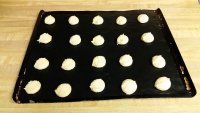Cookies.
Back in 1992, a politician could cause a scandal by denigrating (whether intentionally or no) women who had chosen homemaking as their career: I suppose I could have stayed home and baked cookies and had teas, but what I decided to do was to fulfill my profession....
Be that as it may, my recent decision to spend a good deal of my free time baking cookies was not a political one. I just wanted to be able to bake a chewy cookie.
I love to bake, and have many cookie recipes that I pull out from time to time, but I wanted something different. Every once in a while I had tasted a chocolate chip cookie that was both soft and chewy, but not very often, and it was always from a commercial bakery. I wanted to be able to do it myself. I thought that would be simply a matter of searching online, where one can find a recipe for almost anything. And indeed, I found recipes that claimed to make chewy cookies, but they didn't turn out to be what I was looking for. So I pulled together the results of my research and started my Cookie Project.
I had one recipe in my collection, for ginger cookies, that came close to what I was looking for. That's where I started. I modified nearly every factor that could be changed, one after another, and in combination. I probably baked a couple thousand cookies. Fortunately, we didn't have to eat them all, finding plenty of willing volunteers to help out. Not that we didn't eat more than was strictly necessary ourselves. The great thing is that even the failures were delicious. I modified certain factors, such as the amount of baking soda, because I wanted a flatter cookie—but there was nothing wrong with the fluffier versions.
I am very, very happy with the results. The cookies are chewy exactly as I wanted them to be. Even the plain vanilla version tastes awesome. I've loved every variation I've made so far, and have many more ideas to try in the future. And making these cookies is super easy! I broke many of the baking rules that I grew up with: I melt the butter instead of creaming it (thanks, Heather!), I stir the dry ingredients together instead of sifting them, and I mix it all with a dough whisk instead of an electric mixer. I use a cookie scoop instead of two teaspoons to form the cookies, and instead of greasing my cookie sheets I line them with a Teflon sheet. I can whip up a batch of over 100 great-tasting cookies in less than an hour, most of which is cooking time, because with my oven I have to cook batches in series, not in parallel.
One thing I had to let go was healthfulness. I'm a big fan of making desserts more healthy: using whole wheat flour, cutting the amount of sugar, adding other grains and fruit. I make an oatmeal raisin cookie that tastes great and with a glass of milk provides a healthier breakfast than many cereals. But for this project my object was strictly to produce chewy cookies, so I did what I had to. After achieving the texture I wanted, I did try to reduce the sugar. The cookies still tasted plenty sweet—but the chewiness was gone. So there it is. Don't eat these cookies for your health. They're treats—eat responsibly.
What I gained most from this project, aside from wild success in the cookie department, was a better appreciation for what it takes to make progress on a project. You have to put in the time, you have to spend money on ingredients, you have to try and try and try again. You have to eat a lot of cookies. For my next project, I think I'll turn to bread....
- For a pdf version of the recipe, without pictures, click here.
- For a pdf version with the notes reduced in size so the whole thing fits on two pages, click here.
- For a one-page pdf version of the basic recipe, click here.
Chewy Cookies, Theme and Variations
The Theme (Chewy Vanilla Cookies)
2 eggs, beaten
1 tablespoon water
1 teaspoon vanilla extract
(for Variations, other flavorings to taste)
1 cup salted butter (2 U.S. sticks), melted
½ cup Karo light corn syrup
2 cups sugar
(for Variations, 1 – 2 cups add-ins)
3¾ cups all-purpose flour
1 teaspoon baking soda
½ teaspoon salt
In a large bowl, beat together the eggs, water, vanilla, melted butter, corn syrup, and sugar. (When making a Variation recipe, add other extracts and flavorings with the vanilla, and stir in the add-ins after the wet ingredients have been combined.)
Stir together the flour, baking soda, and salt. Add to wet ingredients and mix well. The dough will be sticky and quite moist.
Drop onto lined or ungreased cookie sheets, using about 2 teaspoons of dough per cookie. Bake at 325 degrees F for 7 to 9 minutes. Do not overbake. Allow cookies to sit for a few minutes out of the oven, then remove them to cooling racks. Store in air-tight containers when completely cool.
The cookies should be flat, textured, and amazingly chewy. They’re wonderful hot out of the oven, but even better the next day. For easy holiday cookies with a more festive look, sprinkle the unbaked cookies with sugar sprinkles of an appropriate color.
Notes
I like to save dishes by cracking the eggs directly into the bowl and beating them there before adding the other ingredients.
Because the butter is melted, this works quite well mixed by hand instead of with an electric mixer. I like to use a Danish dough whisk, adding the ingredients one or two at a time and mixing well after each addition. With an electric mixer, you might want to stir in any add-ins at the end, instead of with the wet ingredients.
If using unsalted butter, increase the salt to 1 teaspoon.
I melt the butter in the microwave, in a 2-cup glass measuring cup. I then can easily measure the corn syrup by adding it until the butter rises to the 1½ cup mark. This saves a dish, makes the syrup easier to pour out of the cup, and helps cool the butter. You don’t want the butter to be so hot it cooks the eggs.
The cookies look nicer if I line the pans with Swiss Teflon baking sheets. You could probably use parchment paper instead.
You can form the cookies the old-fashioned way, using two spoons, but I love my Oxo Good Grips cookie scoops for ease of use and consistency of cookie size I usually use the small (2 teaspoon) scoop, but the medium (1½ tablespoon) works well too; I just add a couple of minutes to the baking time. If I get the large (3 tablespoon) scoop that’s on my Christmas list, I’m going to make cookies big enough to use for homemade ice cream sandwiches….
When storing the cookies, I like to separate the layers—with parchment, plastic wrap, waxed paper, or whatever works for you. I find that coffee filters fit most of my containers perfectly. Otherwise, the cookies tend to stick together.
These cookies freeze very well. Sometimes I freeze them individually on a cookie sheet, then put them loosely in a plastic bag for storage. If you freeze them first, you don’t need to worry about them sticking together, and you can take out a few at a time, as you wish.
It also works great to make and freeze balls of dough for baking later. However, in our house, the frozen dough is likely to get eaten as-is before it has a chance to get into the oven.
The beauty of this recipe, besides that it produces delicious, chewy cookies, is its flexibility.
The Variations
Substitutions
Water The amount of water can be altered as needed, but the recipe is fairly forgiving and 1 tablespoon seems to work well despite variations in the amount of liquid extracts used.
Vanilla I use vanilla in every recipe, even when adding other flavorings or extracts.
Salted butter Unsalted butter works just as well if you increase to 1 teaspoon the salt added with the dry ingredients.
Karo corn syrup This is not the much-maligned high fructose corn syrup, which has had some of its glucose converted to fructose. Other brands of corn syrup may contain some HFCS, but not Karo. The light corn syrup has some added salt and vanilla, but not enough to worry about when you’re making substitutions. If you want the flavor and don’t mind the price, you can substitute honey or molasses (not blackstrap). I think corn syrup is hard to find in Switzerland, but there’s probably some version of glucose syrup or golden syrup that will do. I haven’t tried maple syrup yet, but I think it would be delicious.
Sugar Use white or brown sugar according to your taste. I use white sugar for the lightly-flavored cookies, and dark brown sugar for the rest.
Add-ins The sky’s the limit.
All-purpose flour In my baking, I often like to substitute white whole wheat flour for some or all of the all-purpose, but I haven’t yet experimented much with that for this recipe. First things first.
Variations on the Theme
Chewy Chocolate Chip Cookies Use brown sugar, with chocolate chips (large, small, dark, milk, whatever) as the add-in. Don’t skimp on quality when it comes to the chips! My favorites are Ghirardelli and Guittard.
Chewy Double Chocolate Chip Cookies Use the Chocolate Chip recipe but with 1/4 cup cocoa in place of an equal amount of the flour. I prefer Black Cocoa from King Arthur Flour.
Chewy Mint Chocolate Chip Cookies Use the Double Chocolate Chip recipe and add peppermint extract to taste.
Chewy Hazelnut Chocolate Chip Cookies Use the Double Chocolate recipe, adding hazelnut flavoring to taste. Think Nutella….
Chewy Mocha Chocolate Chip Cookies Use the Double Chocolate recipe, but replace the water with extra-strong coffee. (Or use espresso powder. I love this, but find it has a tendency to clump into a very solid rock after being opened.)
Chewy M&M Cookies Use either the Chocolate Chip or the Double Chocolate Chip recipe, but with M&M’s instead of the chips. I prefer the mini M&M’s. Our chldren's choir went wild over this.
Chewy Butter Crunch Chocolate Chip Cookies Use the Chocolate Chip recipe but make the add-in half chocolate chips (I prefer the minis for this one) and half Heath English Toffee Bits (or use leftover crumbs from making Almond Butter Crunch candy).
Chewy S’more Cookies Just like the Butter Crunch Chocolate Chip recipe, but use small marshmallows instead of the Toffee Bits. For larger cookies, cut-up mini marshmallows might give a better texture; for my small cookies, I used Kraft Marshmallow Bits.
Chewy Lemon and Honey Cookies Substitute honey for the corn syrup in the Vanilla recipe, and add lemon peel (fresh or dried) and/or Boyajian lemon oil (also available at King Arthur Flour) to taste, with the liquid ingredients. I like to add a little yellow food coloring, too.
Chewy Strawberry Lemon Cookies Add cut up dried strawberries to the Lemon and Honey recipe.
Chewy Almond Cherry Cookies Use the Vanilla recipe, adding almond extract to taste (I use at least 1 tablespoon), and dried cherries.
Chewy Cranberry Tangerine Cookies Use the Vanilla recipe, with dried cranberries as the add-in and tangerine (or orange) extract to taste. I used tangerine because I happen to have some tangerine extract, but when that’s gone I’ll use Boyajian orange oil.
Chewy Gum Drop Cookies Use the Vanilla recipe and add cut-up gum drops. I like to use the spice drops and cut them in thirds or quarters. This can get a bit sticky and tedious, but is worth it. This is a variation people seem to have strong feelings about, pro and con. For me, it was a successful attempt to recreate the best of a long-lost recipe my mother used to make on rare occasions. I absolutely loved to taste the dough, up until the point where she added coconut, at which time the cookie was ruined as far as I was concerned. You are welcome to use coconut as an add-in for your own cookies.
Chewy Gummy Worm Cookies Like the Gum Drop variation—but with a different flavor. Cutting up gummy worms is a lot easier than cutting up gum drops.
Chewy Speculaas Cookies Use the Vanilla recipe with brown sugar, and mix Speculaas Spice in with the dry ingredients. (When I can’t get it from Switzerland, I buy mine at King Arthur Flour.) If you believe speculaas cookies should always be crispy and in windmill shapes, think of these as Biscoff cookies. Using one tablespoon of the spice mix gives a strongly-flavored result that tastes more like traditional speculaas cookies; using less might more closely approximate the Biscoff flavor.
Below I have quoted 99% of a post I wrote eight years ago, following the election of Barack Obama. It was part of a series; all I've changed is the introduction and the one sentence that makes no sense outside of that context. When I reread it on the day after Election Day, I was struck by how applicable it still is, for ALL sides. (Note: not both sides. One of our greatest mistakes is thinking there is a single dividing line and each of us falls on one side or the other.) Change the names of the players as you will, the sense remains the same.
Note: This was written specifically for a Christian audience. Anyone else is more than welcome to come along for the ride, but be prepared for a lot of quotations from a source of which you do not recognize the authority. You may still find value in the meaning.
How We Can Sing the Lord's Song in a Strange Land
By the rivers of Babylon we sat and wept
when we remembered Zion.
There on the poplars
we hung our harps,
for there our captors asked us for songs,
our tormentors demanded songs of joy;
they said, "Sing us one of the songs of Zion!"
How can we sing the songs of the LORD
while in a foreign land?
Psalm 137:1-4
First of all, we pick ourselves up with as much dignity as we have remaining and give respect and support to our new leaders. "Fear God, honor the king" (I Peter 2:17) applies in a democracy, too. Humor has an important place in discourse, but mean-spirited mockery does not. I'm extremely uncomfortable with the abuse heaped on George W. Bush, just as I was when it was Bill Clinton on the receiving end, and I will accord Barack Obama the respect due the President of the United States, as well as that due a human being created in the image of God.
We pray for Barack Obama, and for all "who bear the authority of government." If the Apostle Paul could write, per I Timothy 2:1-2, "I urge, then, first of all, that requests, prayers, intercession and thanksgiving be made....for kings and all those in authority, that we may live peaceful and quiet lives in all godliness and holiness," while living under the Roman Emperor Nero, we can do the same living under an elected president who is not likely to include among his alternative energy polices the burning of living, human torches.
We attempt to live our lives in the best, most honest, most noble, and most loving way possible. Back to I Peter again (2:15-16): "[I]t is God's will that by doing good you should silence the ignorant talk of foolish men. Live as free men, but do not use your freedom as a cover-up for evil; live as servants of God." The Republicans would do well to remember that scandal and wrong-doing among office holders has done more than anything else to bring them down. Granted, it's not fair that the Democrats mostly get a pass for their equal or greater sins—although it's actually a compliment that better behavior is expected of Republicans—but the reality is that Republicans were hurt badly first by misbehavior and even more by not visiting swift and sure justice upon the miscreants. To live purely and act rightly, with justice and love and in quiet confidence, will win more hearts than the most reasoned argument.
Do not repay anyone evil for evil. Be careful to do what is right in the eyes of everybody. If it is possible, as far as it depends on you, live at peace with everyone.... Do not be overcome by evil, but overcome evil with good. (Romans 12:17-18, 21)
Do everything without complaining or arguing, so that you may become blameless and pure, children of God without fault in a crooked and depraved generation, in which you shine like stars in the universe. (Philippians 2:14-15)
[L]et your light shine before men, that they may see your good deeds and praise your Father in heaven. (Matthew 5:16).
We attend to the wisdom of the serpent as well as the harmlessness of the dove. Now is not the time to retreat from the political process, but to be all the more involved that we might be alert to dangers that threaten what we hold dear, and to how we might best meet those threats. History has proven that when we are caught unaware we react hastily, badly, and often ineffectively.
We don't flee to the hills, or to another country (as many threatened after losing the 2000 and 2004 elections), or withdraw from the system in sulky silence. It's not time, yet, for "those who are in Judea to flee to the mountains." If we feel like exiles in our own land, it is time to remember what God said to his people at the time of another exile: "Build houses and settle down; plant gardens and eat what they produce. Marry and have sons and daughters; find wives for your sons and give your daughters in marriage, so that they too may have sons and daughters. Increase in number there; do not decrease. Also, seek the peace and prosperity of the city to which I have carried you into exile. Pray to the LORD for it, because if it prospers, you too will prosper" (Jeremiah 29:5-7). We continue to live our lives wisely and without fear. The administration may have changed, but the basic rules of life have not. There's still the Big Ten—don't steal, don't murder, don't mess with someone else's spouse, and all the rest—and the sound-bite version provided by Jesus: "Love the Lord your God with all your heart and with all your soul and with all your mind, [and] love your neighbor as yourself."
Many of us are accustomed to feeling alienated from the general American culture; it may even be easier—or at least clearer—when there's no pretense that "our guys" are in charge. Whether it's financial responsibility, ethical behavior, or wise decision-making, in a democracy the citizens get no better from their government than the majority lives out in their lives. True progress, then, requires that we balance a deliberate counter-cultural structuring of our own lives, families, and communities with a creative engagement of the larger culture. That is how we sing the Lord's song in a foreign land.
A friend of a friend of a friend on Facebook posted an interesting and perceptive analysis of the election based on Maslow's hierarchy of needs. It's a public post, so you should be able to see it here. It may be somewhat simplistic for explaining a complex phenomenon, but I believe he has hit upon an important truth, the same truth that Christian missionaries found when they tried to address spiritual issues before basic material needs.
I've made my own, definitely simplistic, summary of the idea into a graphic.
- I'll be blunt: The term "President Trump" sticks in my throat. I wouldn't have been any happier if Hillary Clinton had won, but at least "President Clinton" has a familiar ring to it.
- Porter sure was wrong when he said Trump would be "The Biggest Loser" because he wouldn't win a single electoral vote. But he was also right: Trump is the biggest loser because he won. The Presidency ages people like nothing else, and he doesn't have very far to go.
- I truly believe the one person most surprised by the outcome of this election is Donald Trump himself. I believe he began the process just to see how far he could go, and never dreamed this would actually happen. In that, if nothing else, the whole country agrees with him.
- I have disliked Donald Trump ever since I once made the mistake of watching 15 minutes of The Apprentice. I longed that the Republicans, somewhere, anywhere along the way, would stand up and tell him, "You're FIRED!" But he is our President-elect, and as such deserves honor and respect. As a human being, he deserves courtesy, and he certainly needs our prayers. I strove, and I hope I mostly succeeded, in granting this to President Obama, and to President Bush before him, even though both of them disturbed me greatly. I intend to do the same for President Trump. If we cannot be civil to one another, it won't be Trump who brings America down.
- I've heard several people announce, bitterly, "He's NOT MY president!" Everyone needs grace in difficult moments, so I'm not holding that against them. But it does sound a bit like a teenager shouting in an argument, "You're not my mother!" A frustrated person has the right to feel that way, but it doesn't change the facts. Mr. Trump IS scheduled to be our president in a few months. True, it's possible to leave and renounce your citizenship, but be forewarned: that process is expensive.
- I predict the next four years will be neither as bad as some people think, nor as good as some people hope. I would have said the same thing if Hillary Clinton had won the election. Much depends on the people he surrounds himself with, and more importantly, on the American people—all of us.
- I've said over and over again that Donald Trump is the Democratic Party's best friend. It doesn't seem that way now, but I'm not taking back my words. The Republic Party is in disarray. The next four years could pave the way for a strong Democratic victory in 2020. Or not. We don't know. But in any case, Donald Trump is in the same position Richard Nixon and Bill Clinton were in their times: being able to take actions and make compromises that would not be acceptable to "his side" if they were proposed by the "other side." (If a Democrat had tried to normalize relations with China, do you think the Republicans would have stood for it?)
- Here's another prediction: Some Trump supporters are in for a rude awakening on some of the issues where they think he is in their corner. I don't trust any politician when it comes to political promises; the track record of them all is too abysmal. Besides, political realities are about give and take, gaining less than you hope for, hoping to lose less than you fear. Barack Obama was not the messiah many people thought he was, and Donald Trump is going to disappoint his followers as well.
- He also may surprise his opponents. As Obama was eight years ago, he stands in a position to be able to surround himself with good people, knowledgeable people who will not be afraid to work with him and challenge him as needed. To recognize and acknowledge that he does not have a "mandate from the American People," but that half the country is bitterly disappointed today. Donald Trump won only because a goodly number of people were so opposed to Hillary Clinton that they either opted out of the two-party system altogether, or voted for him only with great reluctance. That is not a mandate. It is a plea for grace, reconciliation, and healing. Sadly, I believe President Obama failed to recognize this eight years ago. We have another chance. Please, Mr. Trump, don't blow it.
- Donald Trump may not be a lawyer, he may not have experience in government, but anyone who says he has no experience with politics doesn't understand what it means to run a business.
- I read somewhere, weeks ago, that Trump had much more minority support than anyone knew, but it would only become known under the secrecy of the ballot box. That may be true. Florida was expected to go for Clinton because of the Hispanic vote, but while Hispanic voters are credited with Marco Rubio's win, they did not deliver for Clinton.
- One thing this election revealed is that the Democratic Party has once again shifted its population base. I'm old enough to remember when to be from the South was to be a Democrat. Under today's mapping system, the southern states would have been colored solid blue. Within my lifetime that changed radically, to where Democratic appeal is in the West, the Northeast, and big cities almost everywhere. More recently, I remember when the Democrats considered themselves the party of the working class, of the little guy against the rich businessmen. I suspect that many still think they are, which is why they lost this election. Working class people came out in droves yesterday to make it clear that their party has left them.
- For every major election, people joke about dead people voting. It may be debatable whether or how much that happens these days, though it certainly has happened in the past that votes have been cast in the name of those who have died. What I will say is that Early Voting has made it almost certainly a reality in ways that don't have to involve corruption. With an electorate of our size, the odds are almost certain that people have died between the time they cast an early vote and Election Day itself.
- I didn't see it coming, but next year we will enter the dreaded House-Senate-Executive one-party control situation. I'm less afraid of that than I thought I would be, because the Republicans are so far from united with each other, much less with Trump. I have no doubt that the Democrats will be able to find Republicans willing to cross party lines as needed, which actually give me more hope for bipartisan cooperation overall.
- On Election Night, Google popped up a notification on my phone suggesting I follow the election results. That turned out to be great: the results were well presented and easy to follow, and best of all, there was no commentary.
- I went to bed as usual, on the grounds that depriving myself of sleep was not going to have any effect on the election results. But Porter was following the process with NBC, so the TV was on when I got up at 2 a.m. to use the bathroom. I didn't get back to sleep till four. It was at that point that the commentators were coming to grips with the idea that Hillary Clinton might lose, and that was too interesting to miss. I was surprised and impressed by the discussion. With the exception of one of them, who showed genuine fear and went off on an apocalyptic rant, the commentators exhibited humility, respect, and for the most part a willingness, despite their obvious concerns, to give a possible Trump presidency, and the half of America who elected him, a chance. We were wrong. We didn't see this coming. We messed up. Maybe we're too wrapped up in our own, isolated world. They didn't call anyone names, and they seemed genuinely interested in understanding the real issues. I found that genuinely encouraging.
- Trump's speech, too, was encouraging. Knowing how bombastic he can be, I was nervous. But he did well, and so did Clinton, in both her concession speech and the one she gave to her supporters the next day. This is professional behavior. This is civilized behavior. If this civility, after so much of the opposite on both sides, can spread to the rest of us, there's hope for America.
- Finally—and I consider this to be the most important of my ramblings in this post—parents, please reconsider how you share your political feelings with your children. I'm not talking about teenagers, who are not far away from voting age. But by involving your young children in your politics, you are putting burdens on them that they are not ready to handle. I've heard post-election stories of children sobbing uncontrollably when they heard the results, and stories of children wearing Trump hats to school and teasing their classmates cruelly with their gloating. This is what happens when normal childhood behavior meets adult problems. We can, we must do better than that for our children. We do not need to let them see our own anger, griefs, prejudices, and fears. It is enough—it is essential—to teach them to be caring and compassionate, strong and brave, knowledgeable and wise.
Post-Finally, here's a shameless plug. I don't gain anything other than the good will of the author for saying this, but King Ron of the Triceratops, by S. S. Paulson, is a brand-new book that's a story about dinosaurs for children, a cautionary tale for grownups, and a good way to begin discussions about politics and other realities, independent of any particular political leanings. If you think it's about your party—or the other guy's—read the disclaimer. Read the disclaimer anyway. It's funny.
- Someday I suppose I'll give in and sign up for an absentee ballot, just in case I happen to be out of town on Election Day. But "the Tuesday next after the first Monday in the month of November" is right there in the Constitution, and I much prefer to vote on Election Day itself. I took advantage of Early Voting the first year it was available, and it felt so wrong I've never done it since. Besides, I like the camaraderie of voting at our local polling place. I can walk there. I see neighbors there. It makes me feel part of a community.
- You'll never know who I'm voting for tomorrow. You may guess all you want, but you are as likely to be wrong as right. I've been a Democrat all my voting life, but was always just as likely to vote for some other party. I've voted for people from parties you've never heard of—and parties I don't remember. (Hmm. Isn't it a bad sign if you don't remember the party after it's over?) I don't understand voting for a party at all; I belong to one so I can vote in the primary. In any case, I'm a huge believer in the secret ballot. It helps keep the powerful from threatening the weak, and friends from disowning each other on Facebook. Besides, at the moment even I don't know how I'm going to vote.
- Right now I'm almost wishing I'd voted absentee. Back then I felt freer. I was certain the election would be a romp for Clinton. I agreed with Porter, who insisted that Trump would be the Biggest Loser since McGovern. Thus I thought we had the luxury of voting our consciences—making a statement, telling both parties that we're not going to dance to their music if they keep coming up with tunes that make a toddler crashing pans together sound like Mozart. But now it appears that our votes might actually count, which means we have to be more responsible. The trouble is, that which appears to be the responsible decision changes daily, even hourly.
- To my shame, I realized that what I'd rather do is vote selfishly. That is, I want to be able to say, It's not my fault; I didn't vote for him/her.
- Here's a fun little quiz to see how the various candidates align with what's important to you. I'm not sure I believe it entirely, but it is much more nuanced than most such surveys.
- Porter came up with an interesting thought experiment: Suppose there were only four candidates: Clinton, Trump, Johnson, and Stein. Suppose further that the only vote that counts is yours. Whomever you pick will be the next President of the United States. For whom would you vote?
- Much to our surprise, we both picked Jill Stein, with whom each of us disagrees on almost every issue—on the grounds that she would be in a position to do the least harm. Not that her ideas aren't dangerous, but she'd be less likely to be able to implement them. Does that mean I'm voting for her? Your guess is as good as mine.
- I think what scares me most about Clinton is not so much her ideas, but that she's likely to be able to put them into action. If I knew for certain that after this election the Republicans would have control of both the House and the Senate, I'd probably vote for her. Likewise, if I knew both houses would be Democratic, I'd probably vote for Trump. Unlike many of my friends, I do not mourn when the "obstructionists" make the president work hard to implement his ideas; I believe that's their job. When all the branches of the government agree too easily, mistakes are more likely to be made. One thing going for Trump is that so many people—especially politicians—hate him that even a Republican-controlled Congress would tend to rein him in.
- This election is déjà vu all over again, only on a much larger scale. In the 2010 gubernatorial race, Florida voters had to choose between (1) a female, career politician with whom many of us had serious problems (and, I kid you not, who cheated during a debate), and (2) a brash, male, businessman who was a surprise candidate, spent vast quantities of his own money in his campaign, was involved in a business scandal, and was pretty much universally disliked by the political establishment. That was another election in which I made up my mind at the last moment.
- Which is worse, a loose cannon randomly shooting at friend and enemy, which might even explode and sink the ship, or a powerful cannon aimed unerringly at the city in which our children and grandchildren live?
- For the first time, I'm tempted to do a write-in vote. I've thought of writing in my true choice: Noneofthe Above. More seriously, I've thought of Ben Carson, who at least shows strength of character, integrity, and the ability to think well in highly stressful situations. But that feels like an abdication of my responsibility, since it is barely more significant that not voting at all.
- Speaking of Ben Carson: When he was running, where were all the people who told me I was racist if I didn't support Barack Obama?
- I feel as if we're caught in some twisted variation of the Prisoner's Dilemma, in which following the optimal strategy leads to sub-optimal results.
- Fortunately, there is very little correlation between a person's moral rectitude and his ability to do a good job as president. That makes no sense to me, but in my own voting life I've seen good people (Carter, Bush #2) do a terrible job as president, and questionable folk (Reagan, Clinton) do a commendable job. For this reason, I don't worry all that much about the outcome of tomorrow's election. I'm much more concerned about the increasing divisions in our society, stoked by the mainstream media, social media, and self-interested fearmongers everywhere. But that's another post.
- Most of all, as a Christian, I know that bad times will come, and good times will come, and neither our responsibilities nor God's care are dependent on the results of tomorrow's election.
- My most consistent prayer, with regard to our political situation, has been that we will get our leaders according to what we need, rather than according to what we deserve.
- Whatever happens tomorrow, how we treat our neighbors will always be much more important than who wins the election.
 Early Tales of the Atomic Age by Daniel Lang (Doubleday, 1948)
Early Tales of the Atomic Age by Daniel Lang (Doubleday, 1948)
My father was employed by General Electric his entire career, but much of his work was actually done for the federal government. As a child, I was never very curious about what he did when he "went to work," which was a good thing, since he usually couldn't talk about it. Much later, I picked up glimpses, as when we were visiting the Franklin Institute Museum in Philadelphia, and he casually pointed to a (formerly) top-secret military jet in the Aviation exhibit, saying "I helped build that plane." And when he revealed that the maps and information that "The Customer" had provided for my sixth-grade project on Ethiopia actually came from the CIA.
In his early years, he worked on the Manhattan Project, hence the number of books in his library (now mine) on Hiroshima and what was called the Atomic Age. This one is fascinating on several levels.
First, and this is of no little importance, Daniel Lang writes very well. I no longer take that for granted. He could make any subject sound interesting.
Second, it provides perspective on our own time. Here is a well-known, respected, seasoned writer for the New Yorker magazine, in an age generally considered much more concerned with civility and politeness than our own, casually using phrases like "the Japs" to refer to our then-enemy, "girls" when talking about female employees, and "the lady of the house has no servant problem, because Spanish maids from Santa Fe and Indian maids from the pueblos in the Pojuaque Valley are both available and efficient," when speaking about life in Los Alamos.
Most of all, the subject itself is fascinating. The world stood at the very beginning of a new era, and no one was quite sure what to do with the genie we had let out of the bottle. What surprised me the most was the naïveté, driven by fear, with which otherwise highly intelligent and experienced people, not to mention the general public, embraced the idea of putting one, internationally-controlled organization in complete charge of everything pertaining to nuclear materials, from mining and storage to what research might be done and who would be permitted to do it to who would control any bombs that were made. The United Nations had just been born, in much hope, and people had an almost worshipful attitude toward scientists, who had done this wonderful and terrible deed. An elite collection of right-thinking people could and should rule the world!
The broad fear ... was that by recommending an international monopoly they might be helping to create a Frankensteinian bureaucracy which, once it got going, would threaten this nation's civil liberties as well as its economic system. "But the stakes ... were too high for those men not to overcome the fear eventually. They knew that we would have to pay a price for security."
Although during this time the United States was the only country with nuclear technology, no one expected the monopoly to continue for long. The hope was that international control would keep the world's stock of nuclear weapons down to one or two for research purposes, too few for any country to start anything other than a conventional war. They could never have imagined that the Cold War would stay nuclear-free not because there were too few atom bombs, but because there were too many!
What I liked best about Early Tales of the Atomic Age were the stories of the people at all levels of the Manhattan Project (called "Manhattan District," the Army's term, throughout the book), especially when they coincide with what little I remember of my father's business (mostly trips to exotic places like New Mexico), or with what I've read in Richard Feynman's books.
Herewith a few tidbits:
One of the special headaches for the C.I.C. [Counter-Intelligence Corps] was handling the top scientists. Most of the people the Army was trying to keep quiet didn't actually know what the District wanted to produce. The scientists, however, knew more about it than the Army did. An inadvertent tidbit from one of them to an enemy agent, or even to a patriotic gossip, about the state of our plutonium research or some new idea that had been figured out for our electromagnetic separation process might bolix the works. Nor could the Army afford to fire its civilian geniuses for talking loosely. The nuclear boys wanted very much to co-operate, but, owing to a set of apparently ineradicable habits and eccentricities, they failed valiantly on occasion. "Free interchange of information" had been a lifelong practice with them. They were itching to discuss their work.
Also, they didn't take care of themselves, which disturbed the Army, since it was vital that the scientists stay alive at least until the first bomb was dropped. "Some of the world's lousiest auto drivesrs developed the bomb," a lieutenant told me. He added that they didn't walk so well either. ... Dr. Bohr was quite a jaywalker.... They used to say down in General Groves' office, in Washington, that they could always tell when he was coming to call by the sound of screeching brakes. Bohr was a problem from the beginning. When the British smuggled him out of Sweden in the bomb bay of a Liberator, they had to fly very high on the way to England to avoid being intercepted by the Luftwaffe. The crew put on oxygen masks and tried to put one on Bohr, too. The scientist's head, however, proved to be so massive that it wouldn't go on. The plane landed with its precious passenger out cold.
Why he couldn't have held the mask up to his face, since he didn't need his hands to fly the plane, the author does not explain.
A single shelf holds the library [of the newly-formed Federation of American Scientists], which consists of three books—the "Congressional Directory," "American Men of Science," and a copy of the Smyth Report.
The Smyth Report, a.k.a. Atomic Energy for Military Purposes, is also in my father's library and on my list of books to read. What is notable about the above quote is that Lang apparently thought it needed no explanation to his reading public. Similarly, although he clarifies place names like Los Alamos and Oak Ridge in detail, when he mentions Schenectady, he doesn't even add "New York," as if the home of the General Electric Company should be familiar to every American citizen. (It is to me, but I grew up there.)
U-235 becomes so radioactive if more than a certain amount of it—the critical size—accumulates in one pile that it can kill people in the vicinity and that it also soon becomes useless. Yet there was a time when only a few men working on the project, at Los Alamos and the University of Chicago, knew what that critical size was. Meanwhile, Oak Ridge was producing and storing the stuff. A Los Alamos scientist, visiting Oak Ridge on some unrelated errand, inadvertently discovered that the whole installation was heading for trouble. Possibly violating Army rules, he let his colleagues in on the secret.
That story is told, from the other side, in Surely You're Joking, Mr. Feynman! (Writing in 1985, Feynman still refers to women as "girls.")
These scientists had worked for the Manhattan District on various phases of nuclear research, and the Army, temporarily abandoning its policy of "compartmentalization of information," had recently brought them together to pool their knowledge in an effort to determine whether control of atomic energy could be achieved solely by inspecting plants engaged in developing it.
At that time, this method of control was widely regarded as a likely way out. ... The consultants had a variety of reasons for being skeptical about the effectiveness of plant inspection. To begin with, many of the steps involved in developing atomic energy for peaceful purposes are the same as those required to make atomic explosives. ... [A]lthough an international group of inspectors might systematically check on a nation's atomic plants, the possibility of quickly converting those plants to the production of bombs would remain. ... Inspectors working in countries in which they were strangers might easily be given the run-around. ... Moreover, some inspectors might not be particularly interested in doing a good job and might feel not the least insulted if they were offered bribes....
Oops. Tell me again about that treaty we negotiated with Iran?
I knew that at the end World War II the United States had acquired many high-level German scientists, but I hadn't realized that we also plundered a large collection of V-2 rockets. These were employed for many research projects, military and civilian, after the war. I'm certain that this was part of my father's work.
Besides the research, a program of educating personnel in the mechanics and principles of guided missiles is under way. ... The make-up of the student body is international. In addition to Americans, the class includes officers from Canada, Britain, Turkey, Chile, Denmark, France, India, Ecuador, Argentina, the Philippines, China, Mexico, Iran, and Guatemala—all countries, it would appear, that are at the moment considered to be among our likely allies.
Oops again. Emphasis on at the moment.
[Many fears, mostly irrational] manifested themselves during the spring of 1947, when there was nothing radioactive anywhere on the [Brookhaven National Laboratory] site [said director Philip Morse]. Then he corrected himself. "I beg your pardon. In May, one of our physicists did send away to the Kix Cereal Company for an Atom Bomb Ring. They give it to children who save Kix box tops. It has just enough radioactivity in it to keep making little sparks. Rather cute."
Note that both the director and the author were concerned about the public's irrational fears of atomic research, not that an American cereal company was sending a radioactive product to children.
Like most men of research, Dr. Green was reluctant to discuss the possible applications of the White Sands data. Military uses, as I expected, were absolutely secret.... Dr. Green did, however, speculate on one general possibility from which a number of other possibilities could flow. This was the idea of an orbital satellite—a missile that would revolve indefinitely around the earth.... At the height of a hundred miles, the G.E. expert remarked, the satellite would circle the world in one hour and thirty-three minutes. He felt reasonably sure that such a satellite could become a reality in perhaps ten years if this country cared to spend the great sums necessary for its manufacture and maintenance. ... Equipped with the right instruments ... a satellite of this sort would undoubtedly improve weather forecasting. ... A satellite ... could serve as a repeater, or relay, station for transmitting programs or messages. ... Dr. Green abruptly ended his speculations. "Pretty soon I'll start talking about trips to the moon," he said, "and you won't believe anything I tell you."
This time we tried a few new things, but made a point of revisiting some favorites.
Continuing from Part 1 and Part 2:
FOURTH VISIT
Greenhouse Guru Mini San Marzano Tomatoes. Almost everything at the Festival is overpriced, but this is the only one I'd call an out-and-out ripoff. I was hoping for something fresh and tasty, you know, like a real tomato. This was a small bag of the kind of tomatoes I can get any day (for a much better price) at Publix. On top of that, they had been refrigerated.
Chocolate Studio Ghirardelli Chocolate Raspberry Torte. It was every bit as good as it sounds.
Canada "Le Cellier" Wild Mushroom Beef Filet Mignon with Truffle-Butter Sauce. One of my favorites. You have to special order if you want it to be cooked rare, but it's worth it. PLUS, I had gone ahead to grab a table, and when Porter found me he was bringing not only the filet but a small cup of hideously expensive but delicious apple ice wine. He was spoiling me....
France Boeuf Bourguignon: Cabernet Sauvignon-braised short Ribs with Mashed Potatoes, AND Soupe à l'oignon au Gruyère et Cognac. Old favorites that are too good not to indulge in both.
Belgium Belgian Waffle with Berry Compote and Whipped Cream. Another well-worthwhile repeat.
Craft Beers Piggy Wings: Fried Pork Wings with Korean BBQ Sauce and Sesame Seeds. This must be what you get when pigs fly. The pork was small, fatty, and bony (like a true wing), but the barbecue sauce was good.
China Sichuan Spicy Chicken. Everything at the Chinese kiosk sounded delicious, but I remembered how good the chicken was. If we return before the Festival is over, maybe we'll try something different.
We also visited the Ghirardelli booth twice this time. It's a little disappointing that the sample chocolate square is always milk chocolate caramel instead of a chance to taste more of their many, different, delicious varieties, but it's hard to complain about chocolate caramel.
For all the times we've visited EPCOT, we'd never done the Soarin' Around the World ride, so we remedied that deficiency. In contrast to most of the new rides at the theme parks around here—and despite the dire "lawyer warnings"—Soarin' does not bounce you around and slam you into the sides of the car. It only lifts you a bit into the air; the awesome effects are all from the movie that nearly surrounds you. Nor did it make us queasy at all, though it was nearly impossible to avoid flinching at some of the apparent close calls as we soared around the world, from the Matterhorn to Sydney Harbour to the mighty Iguazú Falls. You can see the ride, sans special effects (which included scents), here.
But my absolutely favorite was the one before Cronkite's. I can find no video online (this was in the early 80's, after all), but you can see some pictures and most of the text at Walt Dated World. I've extracted the text below so you can compare the language with the prosaic (boring) lecture-style of today.
Narrator: Where have we come from, where are we going? The answers begin in our past. In the dust from which we were formed, answers recorded on the walls of time. So let us journey into that past, to seek those walls, to know ourselves and to probe the destiny of our Spaceship Earth.
Narrator: Now, suns reverse, moons re-phase, let us return to ancient caves where first we learn to share our thoughts-and to survive.
Narrator: Where are we now? It is the waiting dawn where vast things stir and breathe. And with our first words and first steps, we draw together to conquer the mammoth beast. It is the dawn of a new beginning, the dawn of recorded time.
Narrator: On cave walls we inscribe our greatest triumphs, a growing record of our deeds, to share with others so they too may greet tomorrow's sun.
Narrator: Ages pass and more walls rise in the valley of the Nile. Man-made walls of hieroglyphics. Then with new symbols, we unlock our thoughts from chiseled walls and send them forth on papyrus scrolls.
Narrator: On fine Phoenician ships, we take our scrolls to sea. Real scrolls simplified by an alphabet, eagerly shared at distant ports of call.
Narrator: Deep in the shadows of Mount Olympus, our alphabet takes route, flowering with new expression. Hail the proud Greeks: Aeschylus, Sophocles, Euripides. The theater is born.
Narrator: North, south, east, and west, all roads lead from Rome, a mighty network reaching across the land, welding far-flung garrisons into a growing empire.
Narrator: Glorious Rome, until consumed by the flames of excess. Imperial Rome, lost in the ashes of darkness.
Narrator: Far from the dying embers, Islamic wise men preserve ancient wisdom and weave a rich network of new knowledge linking east and west.
Narrator: In western abbeys, monks toil endlessly transcribing ancient wisdom into hand-penned books of revelation.
Narrator: At last! A new dawn emerges. The dawn of the Renaissance-and a wondrous machine performs as a thousand scribes. Now for all: the printed word.
Narrator: Our books fuel the fires of the Renaissance. It is a time to discover anew the worlds of poetry and philosophy, science and music. As our minds soar, our hands find new expression in the flourishing world of art. Behold, the majesty of the Sistine ceiling.
Narrator: The Renaissance: a beacon through the mists of time, guiding us to a new era. A time of invention and exploding communication.
Narrator: With each day come more paths, more ideas, more dreams, and we build new machines: computer machines that think, that store, sift, sort, and count, that help us chart our course through an age of boundless information.
Narrator: With these machines comes a wondrous new network of communications, a vibrant maze of billions of electronic pathways stretching to the very edge of space.
Narrator: Poised on the threshold of infinity, we see our world as it truly is: small, silent, fragile, alive, a drifting island in the midnight sky. It is our spaceship. Our Spaceship Earth.
Narrator: Now our Future World draws near -and we face the challenge of tomorrow. We must return and take command of our Spaceship Earth. To become captains of our own destiny. To reach out and fulfill our dreams.
Woman: GPC report. Odyssey is complete with position home.
Man: Can you switch to manual payload?
Woman: No problem. Manuel payload is activated. Signal from command execution.
Man: Roger. Are you getting video?
Woman: Affirmative. Delta camera is on and tracking.
Narrator: Our journey has been long. From primal caves we have ventured forth traveling the endless corridors of time seeking answers to our tomorrow. With growing knowledge and growing communication, we have changed our lives, changed our world.
Narrator: From the reaches of space to the depths of the sea, we have spun a vast electronic network linking ourselves as fellow passengers together, on Spaceship Earth.
(Ride vehicles pass by several TV screens.)
Narrator: Today our search for understanding is unbounded by space and time. Vast stores of information, knowledge from everywhere, standing ready at our beck and call to reach us in an instant. With our great network, we harness our knowledge, give it shape and form to serve us, to help create and communicate a better awareness of ourselves, and our world.
Narrator: Ours is the age of knowledge, the age of choice and opportunity.
Narrator: Tomorrow's world approaches, so let us listen and learn, let us explore and question and understand. Let us go forth and discover the wisdom to guide great Spaceship Earth through the uncharted seas of the future. Let us dare to fulfill our destiny.
As a member of the New England Historic Genealogical Society, I receive—among other benefits like admission to their fantastic library in Boston—their American Ancestors magazine. The Fall 2016 issue has an article by Bryan Sykes (author of The Seven Daughters of Eve and other books of genetic genealogy) entitled, "Deep Ancestry and the Golden Thread." The fascinating essay is actually about matrilineal genealogy, but it was the introduction that made me shake my head.
We all take the link for granted these days, but we few scientists working on the Y-chromosome in the mid-1990s...had dismissed any correlation between surnames and Y-chromosomes as highly unlikely. As geneticists, we were familiar with the high rate of non-paternity, which would have disrupted the surname/Y-chromosome association over time. [Upon investigation, however] the strength of the correlation was high enough to make it a useful tool for genealogists and showed, incidentally, that the historical rate of non-paternity in England was far lower, at around 1.3% per generation, than it is assumed to be today.
That was a surprise? Really? The mindset of the "sexual revolution" is now so entrenched and ingrained that intelligent, educated scientists are shocked to learn that most children in the past did know who their daddy was, and shared his name?
I must be missing something.
My grandfather grew orchids. Or at least he tried to. Living as he did in Rochester, New York, his orchid garden was a light box in the basement. If he managed to make them bloom, I know it wasn't nearly as often as he would have liked.
When my father inherited the orchids and their setup, he didn't give them quite the attention that his father had, so it was not surprising that he had less success. He, too, lived in a climate unfriendly to orchids.
I lived for several years in the vicinity of the incredible Longwood Gardens, so it's not surprising that I've seen more than my share of orchids in bloom. I can't say that I understand the fascination they have for many people—Like Nero Wolfe. Their blooms are often bizarre, even macabre, in my eyes. But many are beautiful, and I confess to a special fondness for the vanilla orchid.
And for the blc copper queen.
It was blooming when Porter brought this plant home some four years ago. Despite a great deal of neglect, it steadfastly refused to die. There are advantages to living in a semi-tropical climate. But the orchid never bloomed again.
Until early this month, I noticed this:
Buds! And buds they stayed, growing ever so slowly.
Hurricane Matthew came, and we brought the plant into the garage for safekeeping. Both buds were as tightly closed as ever.
The next morning, the first blossom was in full, glorious flower.
Full many a flower is born to blush unseen, And waste its sweetness on the desert air.
This one, apparently, liked the ignominy of dangling from a bicycle hung from the ceiling in a corner of our garage. But we brought it in and gave it a place of honor in the house for several days, before returning it to the free air and sunshine of our back porch. By then, the second bloom was also in its glory.
As gardeners, we don't get any credit for these beautiful blooms, but I like to think my grandfather would have been pleased.
Permalink | Read 2243 times | Comments (1)
Category Hurricanes and Such: [first] [previous] [next] [newest] Everyday Life: [first] [previous] [next] [newest]
They [meet together] to sing out their thoughts. They would hurt them if they didn't. They're so strong and burn so. With only one throat each they can't make music enough to let it out in private; but what one hasn't another has, and so they gather to help each other's love and thanks out by singing, because everyone then feels that what they all sing he sings and everyone sings, with one mighty voice, and on the great torrent of that voice their big thoughts float out of every heart like great ships out of the harbour to cross the eternal seas.
— George MacDonald
Lilith A
One of my favorite books is George MacDonald's Lilith. The Johannesen edition we have also includes what they call Lilith A, a transcription of MacDonald's unpublished first draft. It has been amazing to read them back to back, to see both what an imaginative and technically able writer he was, and how the story was fleshed out into something magnificent through the rewriting and editing process.
Here is how the above paragraph looks in the published version:
They need help from each other to get their thinking done, and their feelings hatched, so they talk and sing together; and then, they say, the big thought floats out of their hearts like a great ship out of the river at high water.
The final version is more succinct, but I love the original because it speaks more specifically to what it's like to sing in choir.
Permalink | Read 2059 times | Comments (1)
Category Inspiration: [first] [next] [newest]
One of the perks of having an annual Disney pass is the ability to make the spontaneously suggestion, "Do you want to go to EPCOT for lunch?"
Continuing from our list of food experiences,
THIRD VISIT
New Zealand Steamed Green-Lipped Mussels with Garlic Butter and Toasted Breadcrumbs, and Seared Venison Loin with Wild Mushroom Marsala Sauce and Kumara Dumpling. I passed on the mussels, but Porter said they were delicious. The venison was as well, though he said it was not as good as the venison he had in New Zealand itself, being less flavorful. Most of the food at Disney is made more bland than it should be.
Australia Grilled Sweet and Spicy Bush Berry Shrimp with Pineapple, Pepper, Onion and Snap Peas. Good, with more spice than I've come to expect from Disney, probably too much for our friends who like their food mild.
China Sichuan Spicy Chicken. Delicious! Definitely too spicy for our friends who prefer their food mild.
South Korea Korean-style BBQ Beef with Steamed Rice and Cucumber Kimchi. Good, but nothing special, and far too mild. I would have said the salad was cucumber slices with a dash of vinegar—hardly kimchi.
Japan The shaved ice is becoming a tradition. Because we've had the tangerine flavor twice, we tried cherry this time. Good, but tangerine is still the best. Of cousre we had the sweet milk sauce; I need to figure out how to make that at home.
Belgium Belgian Waffle with Berry Compote and Whipped Cream. Delicious! Surprisingly, the concoction was not too sweet, which made it delightful.
Morocco Kefta Pocket: Seasoned Ground Beef in a Pita Pocket. Very good.
France Boeuf Bourguignon: Cabernet Sauvignon-braised short Ribs with Mashed Potatoes. Porter voted this even better than Canada's Filet Mignon (see previous post). Good as it was, I disagreed, and had planned to reassure myself on that point, but...
Canada Canadian Cheddar Cheese Soup served with a Pretzel Roll. By the time we had eaten our way to Canada, I was too full to appreciate the filet, so we chose the bacon-y cheddar soup instead. It was very good, but next time I'm saving room for the beef.
As we made our way to the park's exit, we stopped by the Festival Center's Ghirardelli booth to top off our meal with some complimentary chocolate.
Here's another upside to our hurricane adventure: We had mail delivery on Columbus Day!
I'm guessing they're making up for having been closed last Friday. Whatever the reason, I'm happy! It's been a long stretch without appreciable mail, since what came on Saturday clearly reflected that not much had gone through the system Thursday and Friday.
Permalink | Read 1817 times | Comments (1)
Category Hurricanes and Such: [first] [previous] [next] [newest]
Our power was restored around one in the morning. As the bright light over our bed came on, I mentally chided myself for not being sure it was turned off at the swtich. But actually Porter had turned it on before coming to bed himself. This was so he would be awakened as soon as we had power, and could switch the refrigerator and freezer cords from the generator to the house power.
Generator note 1: We used just under five gallons of gasoline, running the generator on an approximate schedule of one hour out of every four or five, primarily for keeping the refrigerator and freezer (and those of our neighbors) cool.
Generator note 2: This is not a good way to recharge the UPS that powers our computer, house phone, and Internet connection. That takes about 18 hours to recharge.
The house is light again now, with the plywood removed from our windows, and Porter is out dealing with cleanup. A much, much better cleanup scenario than we had anticipated!
For those of you who were wondering, we now have a lovely new faucet for our kitchen sink. Porter had just completed the job, though not yet the cleanup, when power went out.
And the neighbors were happy with the cookies, even if they weren't my best. :)
Permalink | Read 1643 times | Comments (0)
Category Hurricanes and Such: [first] [previous] [next] [newest]
We're fine; the lack of updates is due to the lack of power. We're running the generator for about an hour out of every four or five, to keep the refrigerator and freezer cold, and to charge our cell phones, but it takes a lot more to charge the UPS for the computers and home phone.
So far every hurricane has resulted in a three-day power outage. We're hoping for something less this time, but Duke Energy isn't saying.
More tomorrow, one way or another.
Permalink | Read 1971 times | Comments (2)
Category Hurricanes and Such: [first] [previous] [next] [newest]
Power is off. Then on. Then off. Repeat. Right now it's off, and I'm turning the computer off to save battery.
Permalink | Read 1789 times | Comments (0)
Category Hurricanes and Such: [first] [previous] [next] [newest]



















